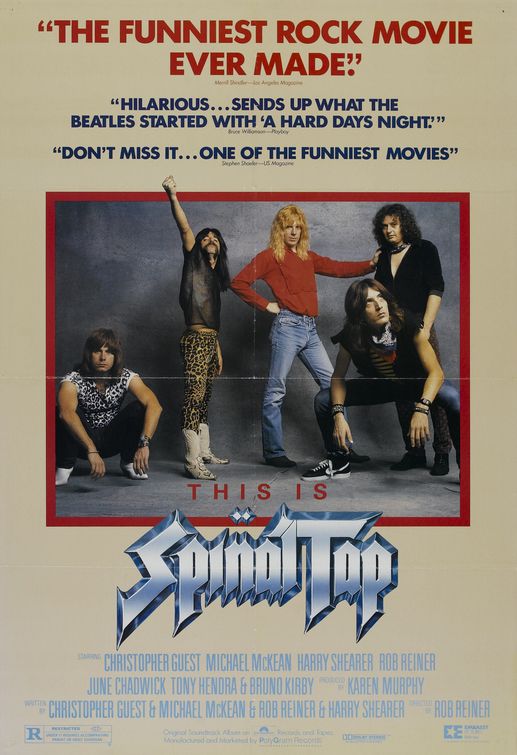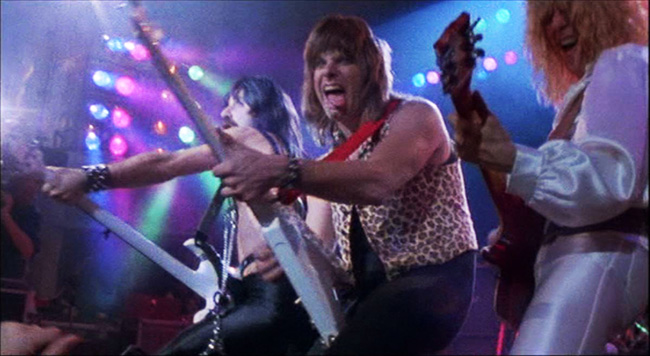
Before the Spinal Tap reunion shows, the many TV appearances, the albums, the induction into the Criterion Collection; before the Christopher Guest-directed mockumentaries, often reuniting Guest with his fellow Tap members; before the exponential rise in the original film’s reputation, now widely regarded as one of the greatest comedies of all time, there was just This is Spinal Tap (1984), not even ninety minutes long, so exactingly assembled that many theatergoers confused it for an actual documentary. They shouldn’t have felt bad about never hearing of Spinal Tap before. The band – principally consisting of guitarists/vocalists David St. Hubbins (Michael McKean) and Nigel Tufnel (Christopher Guest), accompanied by bassist Derek Smalls (Harry Shearer) – had appeared on a failed pilot called The TV Show several years before, performing a song called “Rock and Roll Nightmare.” Neither should anyone have had guilty feelings over not recognizing Guest and Shearer, who were obscure, if prolific, comedic actors, Guest being a veteran of National Lampoon’s Lemmings, Shearer enjoying (or, rather, enduring) a brief run on Saturday Night Live during its first notable fallow period. McKean would have been far more recognizable, being the Lenny of “Lenny and Squiggy” on the hit show Laverne & Shirley, and some may have noticed that on-screen director Marty DiBergi was actually Rob Reiner, who had appeared on All in the Family. But if you failed to place any of the faces, there is nothing to tell you outright that This is Spinal Tap is a big con, and apart from rare examples like Eric Idle’s made-for-TV The Rutles: All You Need is Cash (1978), mockumentaries were not quite a thing just yet. The laughs come from the believable mishaps and embarrassments of an aging touring band well past its expiration date, as depicted warts and all by DiBergi and his crew. Like when the band looks aghast at a theater marquee inside an amusement park, and David’s girlfriend and temporary road manager Janine (June Chadwick, Forbidden World) says, “If I told them once I told them a hundred times to put Spinal Tap first and ‘puppet show’ last.” There were so many bands like Tap – bands which had begun in the 60’s and just followed the changing fashion, from folk to psychedelia to heavy metal, though the more common course was into prog rock and then toothless 80’s pop. (British band The Status Quo is often cited as a band whose mercenary trajectory was very similar to Tap’s.) When Tufnel and St. Hubbins recall their constantly shifting band names in the early 60’s – they called themselves The Originals, but there was another band called The Originals, so they changed it to the New Originals, etc. – the joke, like everything else in the film, dances on the sublime line between authenticity and parody. (Or, as the band would put it, between clever and stupid.)
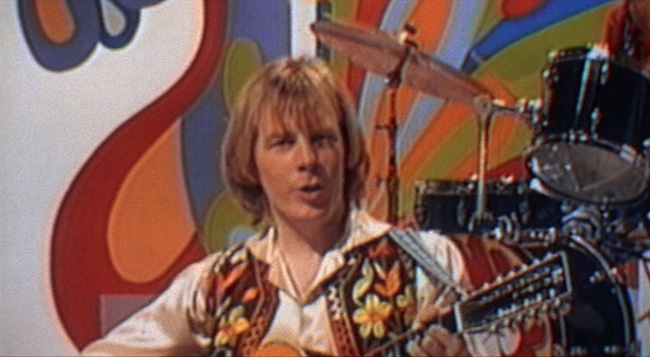
David St. Hubbins (Michael McKean) with Spinal Tap performing “Listen to the Flower People,” in the pre-heavy metal years.
In conceiving of Spinal Tap’s odyssey, Reiner and his lead actors/writers hewed closely to real rock and roll attitudes and anecdotes they had culled over the years, from the fighting in the recording studio (based on a bootleg of The Troggs) to the band being booked at an Air Force Base (Uriah Heep) and getting lost backstage (Tom Petty). The film also borrows a few notes from Martin Scorsese’s film of The Band, The Last Waltz (1978) – “Marty DiBergi” is a nod to Scorsese. Guest, who has played music with McKean since their teenage years, claims the inspiration for Spinal Tap was more general than any one particular band, though he recalled during a 2014 screening and Q&A at the Lincoln Center one specific memory that likely kick-started the project:
“In the ‘70s, I was in LA, in the lobby, waiting for a friend at a hotel,” Guest recalled. “And a British band came in, and the manager went up to the desk, and he was checking in. And he turned, and one of the musicians was standing there, and he said, ‘Where’s your bass, where’d you put your bass?’ ‘I don’t know.’ ‘What do you mean?’ ‘I think I left it at the airport.’ ‘You left your bass at the airport?’ ‘My what?’ ‘Your bass. Where’s your bass?’ ‘I don’t know, do I?’ This went on for 20 minutes. ‘So you’re saying you left your bass at the airport?’ ‘Well I don’t know, do I?’ And I guess somewhere in my head, this lodged into some kind of bizarre one-act play, where this circular thing just kept going around.”
Guest’s Nigel Tufnel – who is perpetually “confused,” as St. Hubbins puts it – thus became the apotheosis of the spaced-out, oversexed, oblivious guitar god, who has a real talent for composing a beautiful medley, but must call it “Lick My Love Pump.” Whatever the inspirations, so accurate is the film’s depiction of rock and roll life that many of the film’s first fans were rock and rollers, recognizing exactly what the film was sending up – people like Robert Plant, Jimmy Page, and Eddie Van Halen. (Although Ozzy Osbourne was one of the dupes who thought it was a true documentary.)
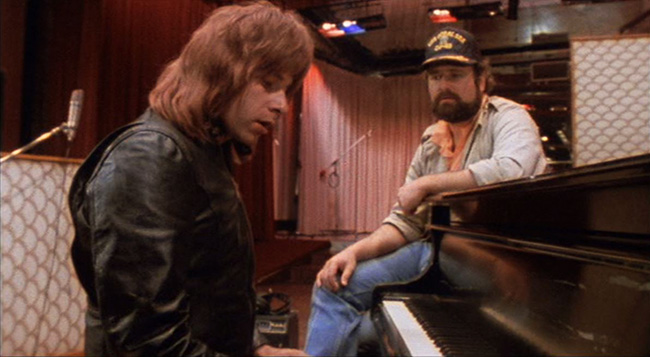
Nigel Tufnel (Christopher Guest) demos “Lick My Love Pump” for director Marty DiBergi (Rob Reiner).
Considering that the film paves the way for the cycle of Guest-directed mockumentaries that began with Waiting for Guffman (1996) – each of which leans hard on its documentary realism – it’s interesting that the improv-driven This is Spinal Tap contains so many scenes of actors breaking character, their deadpan faces bursting into grins. But that kind of “corpsing” (to borrow a British phrase) never swings the film into the cutesy realm of The Carol Burnett Show, where the laughs derive from watching Harvey Korman break up. Oddly, it enhances the reality. Watch the scene where Reiner reads harsh reviews to Guest and McKean, who obviously have no idea what he’s going to say. When he gets to the two-word review of their album Shark Sandwich – “Shit sandwich” – the actors laugh, but then Guest, perfectly in character, accuses Reiner/DiBergi of making it up: “You can’t print that!” In another scene, Guest makes McKean lose it when he describes the fear generated by the “armadillos” in their trousers. In both cases, we don’t necessarily feel the artifice falling away; instead, they seem more like real people, not just caricatures. We’re hanging out with the band. And so we find them even more endearing, even when they can’t see two feet past their noses; like Tufnel beside himself complaining about the size of the bread in his dressing room, or his beautifully delivered dialogue with DiBergi showing off his collection of guitars and amps. The famous “goes to eleven” scene becomes classic comedy with a simple but expertly timed pause after Reiner lucidly explains that Tufnel could have just made ten the loudest. “This one goes to eleven,” he answers, impenetrable.
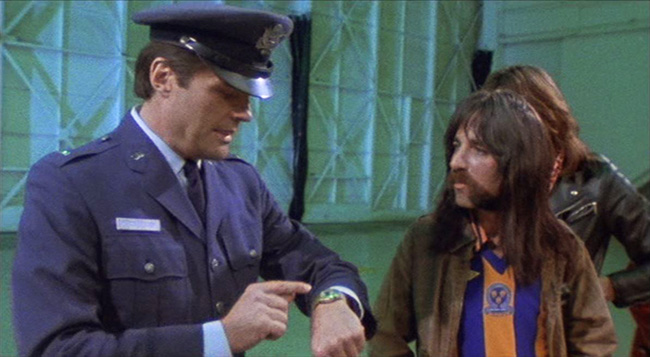
Fred Willard explains military time to Harry Shearer’s Derek Smalls.
Despite the reliance upon improvisation, the film demonstrates a very thoughtful conception and razor-sharp editing (the film was edited down to 82 minutes; a rough cut was closer to four hours). Just look at the way the songs are used. When Reiner wants to build up a gag onstage, the lyrics aren’t overloaded with jokes: “Rock ‘n’ Roll Creation” is pretty straightforward as far as Spinal Tap songs go, because the focus of the humor needs to be on Derek Smalls being stuck inside his chrysalis prop. Similarly, “Stonehenge,” though a knowing pastiche of the fantasy mythologies of 70’s heavy metal, is nowhere near as lyrically funny as “Big Bottom,” “Tonight I’m Gonna Rock You Tonight,” or “Sex Farm” – but that’s because it’s building toward one big, memorable gag. And as for “Sex Farm,” the extreme lewdness of the lyrics are sung over images of its appalled audience. The story arc of This is Spinal Tap is very rudimentary: the band runs afoul of its own Yoko, David’s Horoscope-obsessed girlfriend Janine; their manager Ian Faith (National Lampoon writer and editor Tony Hendra) quits the band; David and Nigel have a falling-out, then finally reunite for a triumphant tour when “Sex Farm” hits big in Japan. It’s just a skeleton on which can be hung any number of improvised scenes or visual gags, like Shearer’s smuggled zucchini or the elaborate build-up to David’s indignant outburst, “I think that the problem may have been that there was a Stonehenge monument on the stage that was in danger of being crushed by a dwarf.” But the structure of the film works, and in its final twenty minutes Reiner allows for scenes which don’t end on a punchline, but help the audience empathize with the characters and lend a bit of emotional heft to support the climax. In subsequent years Guest would run with that baton to greater distances, such that even in an improv comedy like A Mighty Wind (2003), the break-up and reconciliation of folk duo Mitch & Mickey (Eugene Levy and Catherine O’Hara) carries such a human authenticity as to be genuinely moving. But Spinal Tap doesn’t need big emotions. It’s a lean, hilarious, groundbreaking comedy, one whose meta-mythology would spill out infinitely into the real world, as the fake band became, for all intents and purposes, a real one. The blurring goes ever on; in the film, Spinal Tap plays a fake venue in Milwaukee called Shank Hall. Since 1989, there has been a real Shank Hall in Milwaukee. In 1992, Spinal Tap held a press conference there. Spinal Tap has become the ouroboros of parody.
